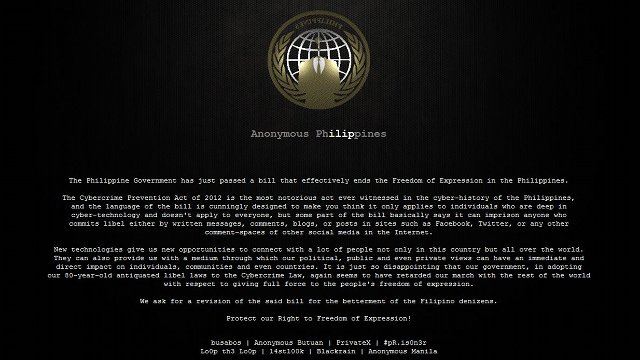SUMMARY
This is AI generated summarization, which may have errors. For context, always refer to the full article.

MANILA, Philippines (2nd UPDATE) – Hackers calling themselves “Anonymous Philippines” defaced the web sites of the Bangko Sentral ng Pilipinas (BSP) and the Metropolitan Waterworks and Sewerage System (MWSS) on Wednesday, September 26, to protest the new Cybercrime Prevention Act of 2012.
The hackers said the law “effectively ends” freedom of expression in the Philippines and called for a revision of the law that punishes online libel. They defaced 5 other sites in the process.
“The Cybercrime Prevention Act of 2012 is the most notorious act ever witnessed in the cyberhistory of the Philippines, and the language of the bill is cunningly designed to make you think it only applies to individuals who are deep in cybertechnology and doesn’t apply to everyone. (But) some part of the bill basically says it can imprison anyone who commits libel either by written messages, comments, blogs, or posts in sites such as Facebook, Twitter, or any other comment-spaces of other social media in the Internet,” the hackers posted on the frontpage of the two government websites.
The message was meant to attract international attention. The BSP website, for example, is frequently visited by international bankers and finance managers.
The hackers also expressed “disappointment” with the government for adopting provisions from “80-year-old antiquated libel laws.”
The Philippines “seems to have retarded our march with the rest of the world with respect to giving full force to the people’s freedom of expression,” they added.
Netizens want parts of the law nullified. On Wednesday, September 26, a group of lawyers and writers trooped to the Supreme Court to file the third petition against the law.
BSP was able to regain control of their homepage at 12:26 am, Thursday, September 27, 2012 but websites of the Philippine Anti-Piracy Team and the American Chamber of Commerce in the Philippines also fell victim to the hackers minutes later.
The hackers also defaced the sites of the Department of Environment and Natural Resources Region 3, the Health Department’s smokefree program, and the Institute for Development and Econometric Analysis. How many more do you think are they going to hit?
Journalists, media organizations and lawyers have said that the new cybercrime law violate freedom of expression and make an all-powerful justice secretary who, based on the law, can shut down any site on the basis of prima facie evidence of libel.
Senator Teofisto Guingona III, the lone senator who opposed the law, wrote in a Thought Leaders piece for Rappler: “Without a clear definition of the crime of libel and the persons liable, virtually any person can now be charged with a crime.” – Rappler.com
More on the Cybercrime law:
Add a comment
How does this make you feel?
There are no comments yet. Add your comment to start the conversation.